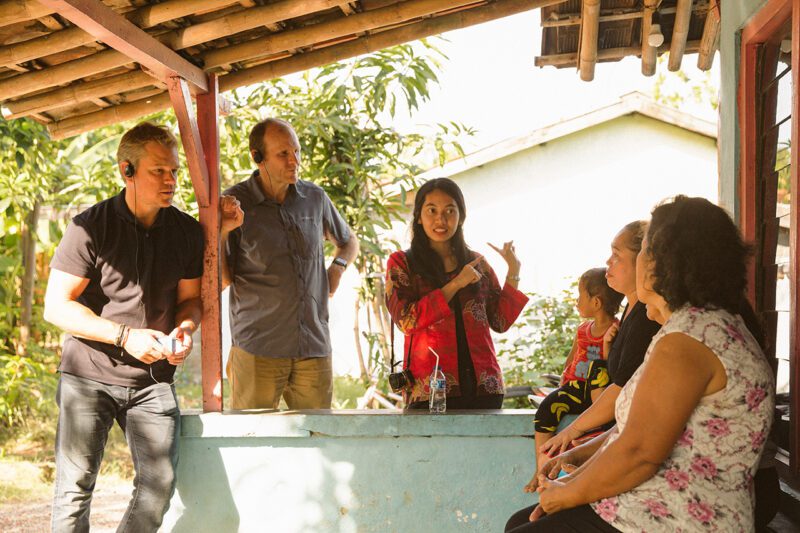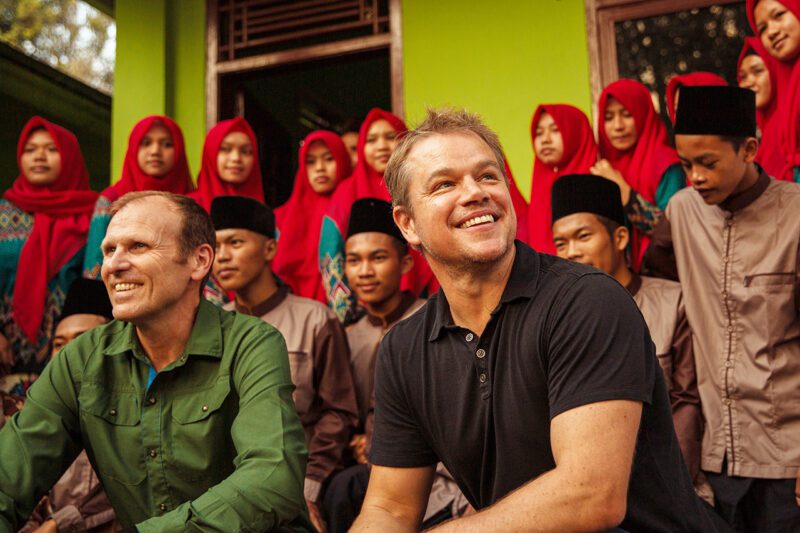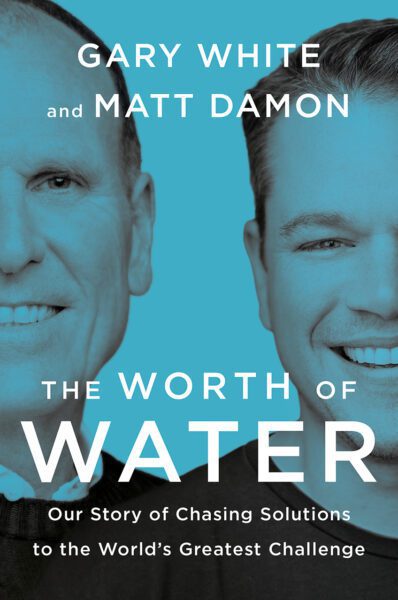Sovereign Seeds: Reclaiming MENA’s Agricultural Future
Reviving local food systems and unlocking rural prosperity
A World Water Day special feature

IE Correspondent Allison Lee sought out Gary White and Matt Damon, co-authors of the recent book, The Worth of Water, for a conversation. The book explores their journey to end the global water crisis, and describes the creation of their organizations Water.org and WaterEquity. Gary White is CEO and Co-Founder of Water.org and WaterEquity. An engineer and water expert, Gary has been working at the forefront of global water access issues for almost the entirety of his career. Matt Damon is Co-Founder of Water.org and WaterEquity. Matt is an award-winning actor and producer, who has also become an expert on water, and is fully dedicated to ending the global water crisis through his partnership with Gary.
What is the intended audience for your book? How is your book helpful for impact entrepreneurs?
Gary: Our book was written for everyone, including those who may not have a background in water-related issues or engineering. The people we’ve met and gotten to work with around the world inspired us to write this book. The mostly women and girls who — literally — carry the burden of providing safe water for their families inspire us every day. We have felt incredibly lucky to be part of their story, and we’re excited to share it. Every day, they show that a massive problem — the global water crisis — can be solved by resilient people and innovative ideas, much like the impact entrepreneurs who read your magazine. We want the world to see how that happens and be inspired.

Courtesy of Water.org
Matt: This work has been an exciting journey, and the book brings readers along with us — as we take big steps forward, as we stumble, as we have light bulb moments, and as we work in partnership with some wonderful, inspirational people. We are the ones narrating this story, but really, it’s not our story. It belongs to all the people around the world who have lived it, who are achieving something amazing together.
The Stella Artois/AB InBev and Water Resilience Coalition anecdotes in the book were notable examples of companies implementing corporate social responsibility (CSR) in a strategic way: making the business case for their initiatives that address the water crisis. What is your strategy when seeking support from the private sector; e.g., how do you approach corporations whose business goals — not just their social impact goals — can be aligned with the goals of Water.org and WaterEquity?
Gary: Demonstrating how supporting water-related initiatives can be integrated strategically into their overall business strategy has been key in approaching companies to engage with us. Water management is no longer just an issue of corporate social responsibility — it is now critical to business operations. This includes increasing access to water and sanitation services across corporations’ global footprint, in addition to addressing water quality and scarcity through replenishment projects. Companies are also realizing that in addition to their philanthropic giving to organizations like Water.org, they can also use their balance sheet to invest in investment funds such as WaterEquity’s, just like they would for any other strategic investment that adds value to their business.
Matt: We are thrilled to partner with innovative and influential companies to execute on their water stewardship plans. Ending this crisis requires an all-hands-on-deck approach. Relying on public resources alone won’t cut it — the philanthropic and private sectors must play a key role.

Courtesy of Water.org
Impact measurement is a pain point for companies and organizations, and difficult to do in a meaningful way. In the book, you mention that you’ve counted “the number of people who, thanks to the fund, had gained water and sanitation”, which is a solid example of measuring outputs. Can you also describe how you’ve measured the outcomes/impact of your work?
Gary: Impact data is crucial to our strategy at both Water.org and WaterEquity. Using WaterEquity as an example, our funds integrate impact measurement into every stage of the investment cycle, beginning with the initial design of the investment strategy. The impact of every investment is evaluated across multiple dimensions to confirm alignment with impact objectives. We also look to the SDGs – specifically the SDG targets – for guidance on which metrics to track. For example, for SDG 6 (Clean Water and Sanitation) we focus on targets 6.1 (“By 2030, achieve universal and equitable access to safe and affordable drinking water for all“) and 6.2 (“By 2030, achieve access to adequate and equitable sanitation and hygiene for all and end open defecation, paying special attention to the needs of women and girls and those in vulnerable situations”). Both targets come with specific indicators that look at the proportion of the local population that has increased access to clean water and sanitation.
Water.org and WaterEquity have positively transformed more than 63 million lives around the world by using market-driven financial solutions to end the global water crisis.
Matt: But these metrics only tell part of the story. We think it’s also important to hear from people on the ground directly affected by these loans. There are so many stories of people’s lives being transformed by a microloan, and each new story offers a new perspective on where the market need is greatest. We use these stories, supplemented by data, to adjust our strategy and better target our work across both Water.org and WaterEquity. The book shares some of the stories of the incredible people — mostly women — who are leading the solution and, often, the ones most affected by the water crisis.
You show a lot of respect for the people you’ve helped get access to clean water, and, as you write in the book, they are not a “problem to be solved, but a “market to be served”. Investing in their initiative and power, as opposed to a “charity-only approach”, is a key aspect of Water.org and WaterEquity’s goals. What advice do you have for organizations sharing this philosophy and/or the people interested in supporting them?
Gary: Partnering has been key to helping people solve their own problems, which is central to our market-based approach. Every partnership offered an opportunity to learn from people who operate in very different spheres, very different markets and to learn together as we advance together. We see our role as being a catalytic partner. We have helped microfinance institutions, self-help groups, community-based organizations, governments, utilities, and supply chain entities recognize that the people at the base of the pyramid, empowered with access to finance, really can solve the water crisis. We’ve partnered with over 150 institutions in 18 different countries. And together, Water.org and WaterEquity have positively transformed more than 63 million lives around the world by using market-driven financial solutions to end the global water crisis.
The single most important thing we want people to take away from this book is that the crisis is solvable.
You mention the systems change that had to occur to see progress in your work toward ending the water crisis. How can impact entrepreneurs like yourselves effect this systems change?
 Gary: Solving for systems change involves addressing complex challenges by understanding and influencing the underlying structures, relationships, and dynamics. It’s a complex and iterative process, and it often requires a long-term commitment. We originally started with direct interventions — such as directly funding well-drilling — but then realized early on that ending the water crisis is, at its core, a funding problem. Lack of financing is the key barrier preventing people from securing safe water or sanitation, and the infrastructure necessary to deliver it. We spent years working directly with financial institutions abroad to get them to establish robust water and sanitation microlending programs — building out a market through both philanthropy and investment — to connect those in need with access to capital.
Gary: Solving for systems change involves addressing complex challenges by understanding and influencing the underlying structures, relationships, and dynamics. It’s a complex and iterative process, and it often requires a long-term commitment. We originally started with direct interventions — such as directly funding well-drilling — but then realized early on that ending the water crisis is, at its core, a funding problem. Lack of financing is the key barrier preventing people from securing safe water or sanitation, and the infrastructure necessary to deliver it. We spent years working directly with financial institutions abroad to get them to establish robust water and sanitation microlending programs — building out a market through both philanthropy and investment — to connect those in need with access to capital.
Matt: I think a lot of people think problems like the water crisis are so big that they’re permanent parts of life on this planet. But the single most important thing we want people to take away from this book is that the crisis is solvable. Not ‘hopefully, eventually, theoretically’ solvable, but right here, right now. As you’ll read in the book, if either of us had let our fear hold us back, we would never have started in the first place. We knew we were going to make mistakes, and we made good on that prospect! But we’re absolutely convinced that even the biggest, most intimidating problems will yield, in the end, to the determination of human beings around the world to make progress. This is just as true for individuals as it is for organizations like ours.
Gary White discusses his partnership with Matt Damon
Gary White on lessons learned since the book was published
Related Content
Comments
Deep Dives

Featuring
Clarisse Awamengwi
IE Correspondent
July 17 - 12:00 PM EST

Featuring
Russell McLeod
July 24 - 12:00 PM EST
RECENT
Editor's Picks
Webinars
News & Events
Subscribe to our newsletter to receive updates about new Magazine content and upcoming webinars, deep dives, and events.
Become a Premium Member to access the full library of webinars and deep dives, exclusive membership portal, member directory, message board, and curated live chats.
At Impact Entrepreneur, we champion fearless, independent journalism and education, spotlighting the inspiring changemakers building the Impact Economy. Diversity, equity, sustainability, and democracy face unprecedented threats from misinformation, powerful interests, and systemic inequities.
We believe a sustainable and equitable future is possible—but we can't achieve it without your help. Our independent voice depends entirely on support from changemakers like you.
Please step up today. Your donation—no matter the size—ensures we continue delivering impactful journalism and education that push boundaries and hold power accountable.
Join us in protecting what truly matters. It only takes a minute to make a real difference.
0 Comments